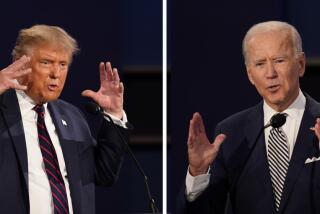Colin Powell Isn’t a Third-Party Player : Politics: The general’s best strategy for making history is to wait for a bid to run with Dole (or Wilson).
- Share via
It is bemusing to hear learned pundits discuss the prospects of a Colin Powell run for the presidency in 1996. The most popular scenario has the retired Army general leading a late and yet-to-be-defined third-party charge to save American voters from the limitations of a presumed Clinton vs. Dole (or Gramm) choice.
Powell has done nothing to encourage the speculation, remaining tight-lipped even about his political party affiliation. He has rebuffed the embrace of Bob Dole to be an “adviser,” and he has resisted the usually irresistible temptation to publicly revel in his celebrity status. To some, his rectitude is positively unpresidential.
Powell’s widely publicized and long-awaited book is due out this fall, and much is being made of his national and international book tour coinciding with the traditional fall commencement of the presidential campaign season. Were it a scripted presidential launch, it could outshine both Democratic and Republican campaigns for originality, substance and media appeal.
But none of this intriguing scenario will come to pass, because Colin Powell will not run for President in 1996. (Although he does appear to be a running-mate-in-waiting for the nod from Dole or Pete Wilson, should the California governor win the GOP nomination.)
There are two important reasons why Powell will not be a third-party candidate in 1996: The former chairman of the Joint Chiefs is a traditionalist, and a third-party campaign is anything but traditional for a chain-of-command adherent. Also, Powell is cautious, accustomed to careful strategy-making that has the highest potential for success and the lowest for risk.
Unlike Ross Perot, who started his own company at age 22, Powell is not an entrepreneur or a maverick, two characteristics that would be required for such an undertaking. A campaign against a sitting President, no matter how embattled, is risky, and success as a third-party candidate has eluded all who have tried in this century.
There are a few other solid reasons why the general will not climb into the presidential ring. Among them are matters having to do with privacy and the sub rosa issue of race relations in America.
Presidential candidates are subjected to inordinate levels of press and public scrutiny, particularly since the Watergate period. It is not that Powell could not pass muster; he could. But he appears to value his privacy better than most public figures with global name recognition. Everything we have heard about his humble origins and the work ethic that propelled him to the highest office in the military approaches heroic myth proportions. But when was the last time we heard anything at all about his family?
As a matter of personal preference, it is clear that Powell, even if he really wants to be President, does not want to be seen as wanting to be President. He would prefer, like Ike, to be drafted for the office. Such a posture would also be much more in harmony with his proclivity for caution.
Finally, as with so many important issues in America, there is the matter of race. Powell has met and bested the racial challenge throughout his military career, putting out racial skirmishes in the ranks in Vietnam and surviving thinly veiled inquiries about his abilities to command. But a presidential campaign is different.
The man who would be the first African American President would be expected to talk intimately and extensively about race in both personal and public-policy terms. This would be uncomfortable and distasteful for Powell, who has excelled at putting competence and performance over race and ethnicity.
The holiday from bigotry, criticism and intrusion that he now enjoys would vanish the moment he took the point in a presidential campaign. For all the current talk about his considerable political virtues, there would come the unavoidable encounter with that segment of American society we have come to know as “angry white males.”
Unless the Republicans have a brokered convention in San Diego--not an entirely preposterous possibility, given the crowded field--we will see Powell make himself available for the No. 2 spot. This would be the best step if Colin wants to make history as America’s first black President.
More to Read
Get the L.A. Times Politics newsletter
Deeply reported insights into legislation, politics and policy from Sacramento, Washington and beyond. In your inbox three times per week.
You may occasionally receive promotional content from the Los Angeles Times.










